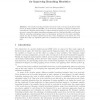1176 search results - page 6 / 236 » Sparse reward processes |
SAT
2004
Springer
15 years 5 months ago
2004
Springer
The variable branching heuristics used in the most recent and most effective SAT solvers, including zChaff and BerkMin, can be viewed as consisting of a simple mechanism for rewa...
109
click to vote
IJCAI
2007
15 years 1 months ago
2007
Inverse Reinforcement Learning (IRL) is the problem of learning the reward function underlying a Markov Decision Process given the dynamics of the system and the behaviour of an e...
114
click to vote
NIPS
2004
15 years 1 months ago
2004
We consider an MDP setting in which the reward function is allowed to change during each time step of play (possibly in an adversarial manner), yet the dynamics remain fixed. Simi...
120
click to vote
JAIR
2006
14 years 11 months ago
2006
A decision process in which rewards depend on history rather than merely on the current state is called a decision process with non-Markovian rewards (NMRDP). In decisiontheoretic...
ICML
2006
IEEE
16 years 15 days ago
2006
IEEE
How should a reinforcement learning agent act if its sole purpose is to efficiently learn an optimal policy for later use? In other words, how should it explore, to be able to exp...

